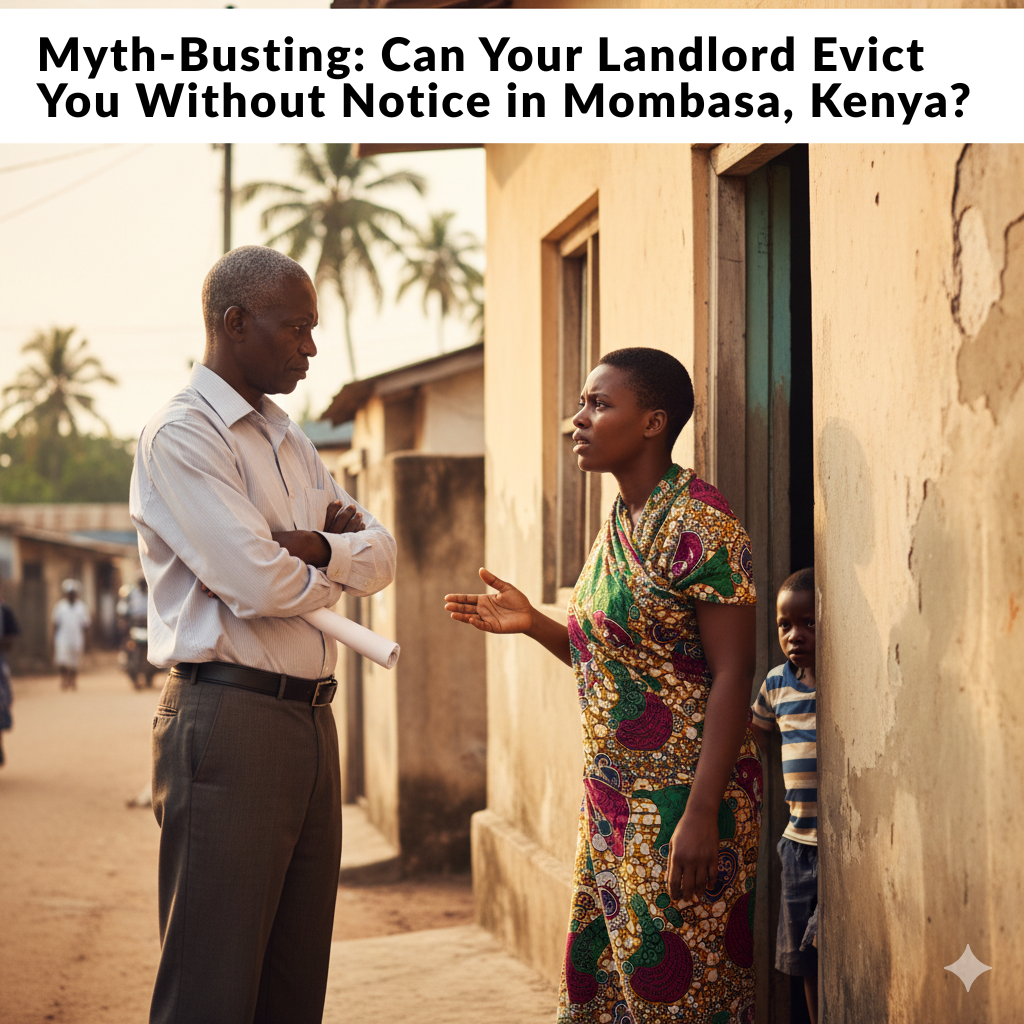Learn more about Evictions and Rental Disputes in Mombasa, Kenya
Home / Blog Post
A Detailed Look Into Important Legal Topics, Written by Our Legal Experts. Get Useful Advice, Legal Explanations, and Practical Tips.

Can Your Landlord Evict You Without Notice in Mombasa, Kenya?
The fear of coming home to locked doors, disconnected water, or a “vacate immediately” note is one of the most stressful myths in landlord-tenant law. Many tenants in Mombasa believe a landlord can simply tell them to leave — or worse, change the locks overnight.
Let’s set the record straight.
The Short Answer: NO.
In Kenya, a landlord cannot lawfully evict you without due process. Eviction is a formal legal process, not a private decision by the property owner. If you are facing this situation, consulting an eviction lawyer in Mombasa is the safest way to protect your rights.
Myth #1 Busted: The “Instant Lockout” (Self-Help Eviction)
The Myth:
“If I miss rent, my landlord can change the locks, cut the water, or throw my property outside.”
The Reality (Kenyan Law):
Such self-help actions are illegal. Only a court (or the relevant Tribunal, where applicable) can authorise an eviction.
Cutting utilities, removing doors, or blocking access amounts to unlawful eviction and exposes the landlord to civil liability and possible criminal sanctions.
Case law in Kenya has repeatedly confirmed that a tenant cannot be evicted without a court order (see e.g. Republic v Commissioner of Police ex parte Patrick Ogola Onyango & 12 others [2013]). If you experience this, you should immediately seek assistance from a tenant rights lawyer in Mombasa.
Myth #2 Busted: “No Notice is Needed”
Eviction begins with notice. The type of notice and procedure depends on:
Type of Tenancy:
- Controlled residential premises (under the Rent Restriction Act, Cap 296)
- Controlled business premises (under the Landlord & Tenant (Shops, Hotels and Catering Establishments) Act, Cap 301)
- Private leases under the Land Act, 2012
Reason for Termination:
- Non-payment of rent
- Breach of tenancy conditions (e.g. illegal use, alterations)
- Expiry of lease term or landlord’s intention to use the property
Legal Requirement:
A written notice must be served, giving the tenant reasonable time to respond or remedy the issue.
Where premises are “controlled,” disputes over notices are handled before the relevant Tribunal — not by the landlord acting unilaterally. In Mombasa, this often means filing at the Business Premises Rent Tribunal or the Rent Restriction Tribunal. Many landlords and tenants choose to work with a rental disputes lawyer in Mombasa to guide them through the process.
The Two-Step Protection for Tenants
Kenyan law provides two layers of protection against unlawful eviction:
- Notice: A written notice must first be issued to terminate or alter the tenancy.
- Court/Tribunal Process: If the tenant disputes the notice or fails to comply, the landlord must file a claim in court or at the relevant Tribunal. Only after a valid order is issued can eviction be carried out, often with the assistance of law enforcement.
Without these steps, any attempt at eviction is unlawful. A landlord-tenant lawyer in Mombasa can represent either side to ensure the matter is handled legally.
Protect Your Rights: Don’t Face It Alone
If you receive a notice to vacate or suspect unlawful eviction:
- Seek legal advice immediately.
- An advocate can check if the notice is legally valid, raise defenses (e.g. retaliation, improper service), or represent you before court/tribunal.
- Don’t ignore notices — time is critical.
At Borona & Associates Advocates in Mombasa, we help tenants and landlords navigate the law lawfully, ensuring rights are protected and disputes resolved within the law. Whether you need a property dispute lawyer in Mombasa, representation before the tribunal, or a consultation on tenant rights, our team is ready to assist.

Borona Advocates & Associates
Tel: +254 736 996870 | +254 728 838420
Email: info@boronaadvocates.co.ke

This article is intended for informational purposes only and does not constitute legal advice. Laws and procedures may change, and individual cases vary. If you are facing legal issues or have been arrested, consult a qualified advocate or legal aid organization in Mombasa for professional legal guidance.
